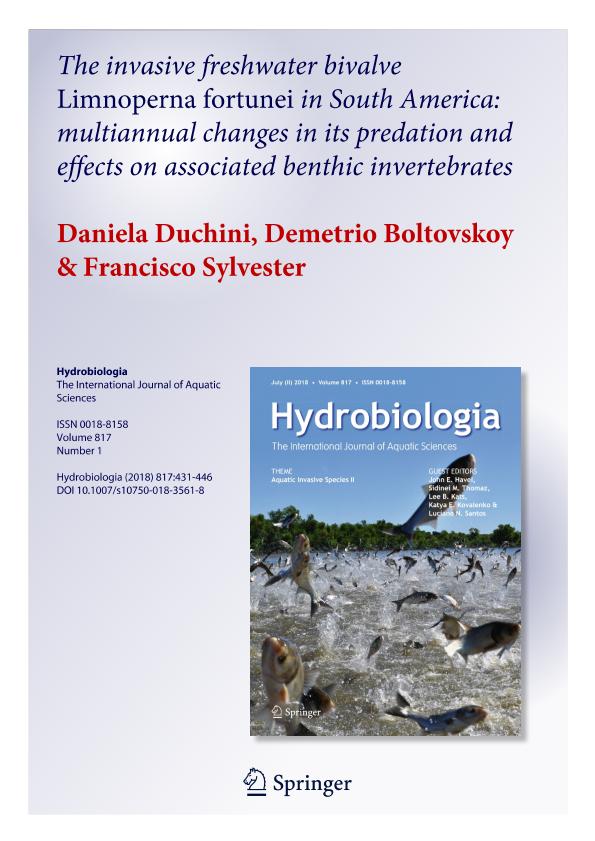Mostrar el registro sencillo del ítem
dc.contributor.author
Duchini, Daniela

dc.contributor.author
Boltovskoy, Demetrio

dc.contributor.author
Sylvester, Francisco

dc.date.available
2019-12-06T15:30:21Z
dc.date.issued
2018-07-08
dc.identifier.citation
Duchini, Daniela; Boltovskoy, Demetrio; Sylvester, Francisco; The invasive freshwater bivalve Limnoperna fortunei in South America: multiannual changes in its predation and effects on associated benthic invertebrates; Springer; Hydrobiologia; 817; 1; 8-7-2018; 431-446
dc.identifier.issn
0018-8158
dc.identifier.uri
http://hdl.handle.net/11336/91621
dc.description.abstract
The invasive golden mussel Limnoperna fortunei is known to strongly affect benthic communities in South American freshwaters, but the evolution of these effects after the early invasion stages is poorly understood. Using predator exclusion (covered with 15- and 40-mm meshes) and inclusion (unprotected) substrates, we investigated the interaction between golden mussels and benthic invertebrate communities at different levels of exposure to predators in the Paraná River delta. Colonization of the substrates was largely dominated by the mussels. Oligochaeta, Nematoda, and Hirudinea were the most abundant accompanying groups, while Rotifera, Tardigrada, Copepoda, Cladocera, Chironomidae, Gastropoda, Hydracarina, Amphipoda, and nauplii appeared sporadically. Regardless of their different trophic modes and functional attributes, the numbers and biomass of associated invertebrates were not only enhanced by protection against predators, but also by the presence of mussel colonies. Enhancement of invertebrate densities associated with mussel colonies was higher on unprotected than protected substrates, suggesting that invertebrate facilitation increases with increasing predation pressure. Comparisons with a similar study carried out a decade earlier suggest that, after two decades of invasion, the reproductive potential of the mussel, the predation pressure on its colonies, and its facilitation effects on other invertebrates have increased in the Paraná River delta.
dc.format
application/pdf
dc.language.iso
eng
dc.publisher
Springer

dc.rights
info:eu-repo/semantics/openAccess
dc.rights.uri
https://creativecommons.org/licenses/by-nc-sa/2.5/ar/
dc.subject
ARGENTINA
dc.subject
BENTHIC INVERTEBRATES
dc.subject
FACILITATION
dc.subject
LIMNOPERNA FORTUNEI
dc.subject
MULTIANNUAL CHANGES
dc.subject
PREDATION
dc.subject.classification
Ecología

dc.subject.classification
Ciencias Biológicas

dc.subject.classification
CIENCIAS NATURALES Y EXACTAS

dc.title
The invasive freshwater bivalve Limnoperna fortunei in South America: multiannual changes in its predation and effects on associated benthic invertebrates
dc.type
info:eu-repo/semantics/article
dc.type
info:ar-repo/semantics/artículo
dc.type
info:eu-repo/semantics/publishedVersion
dc.date.updated
2019-10-09T20:44:39Z
dc.identifier.eissn
1573-5117
dc.journal.volume
817
dc.journal.number
1
dc.journal.pagination
431-446
dc.journal.pais
Alemania

dc.description.fil
Fil: Duchini, Daniela. Consejo Nacional de Investigaciones Científicas y Técnicas. Oficina de Coordinación Administrativa Ciudad Universitaria. Instituto de Ecología, Genética y Evolución de Buenos Aires. Universidad de Buenos Aires. Facultad de Ciencias Exactas y Naturales. Instituto de Ecología, Genética y Evolución de Buenos Aires; Argentina
dc.description.fil
Fil: Boltovskoy, Demetrio. Consejo Nacional de Investigaciones Científicas y Técnicas. Oficina de Coordinación Administrativa Ciudad Universitaria. Instituto de Ecología, Genética y Evolución de Buenos Aires. Universidad de Buenos Aires. Facultad de Ciencias Exactas y Naturales. Instituto de Ecología, Genética y Evolución de Buenos Aires; Argentina
dc.description.fil
Fil: Sylvester, Francisco. Universidad Nacional de Salta. Facultad de Ciencias Naturales. Instituto para el Estudio de la Biodiversidad de Invertebrados; Argentina. Consejo Nacional de Investigaciones Científicas y Técnicas; Argentina
dc.journal.title
Hydrobiologia

dc.relation.alternativeid
info:eu-repo/semantics/altIdentifier/url/https://link.springer.com/article/10.1007/s10750-018-3561-8
dc.relation.alternativeid
info:eu-repo/semantics/altIdentifier/doi/http://dx.doi.org/10.1007/s10750-018-3561-8
Archivos asociados
